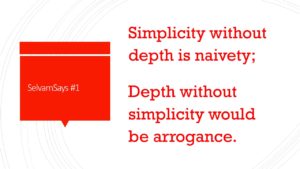 Towards Simplicity and Depth
Towards Simplicity and Depth
(Mal 1:14-2:2, 8-10; 1The 2:7-9,13; Mt 23:1-12)
I had a dream. I insist it was only a dream.
White smoke was spewing out of the chimney of the Sistine chapel of theVatican. “Habemus Papam,” they announced. Next thing, I saw was, the new pope at his window. But he looked just ordinary: there was nothing of scarlet on him; he was dressed in normal clothes, no ring on his finger, no mitre, he just had a simple cross hanging down his neck. As the spontaneous cheer of the thousands gathered at St Peter’s went quiet, as the scene was beamed to millions in their homes across the globe, and as the cameras zoomed in, the new pope began to speak: “Simplicity and Depth”, he said […]
Month: October 2023
Sermon for Cycle A – 30th Sunday Homily: Loving
 30th Sunday of the Year
30th Sunday of the Year
Love!
It is said that at the time of Jesus the rabbis could count up to 613 commandments contained in the Law: 365 were prohibitions (don’t do this!) and 248 were prescriptive (do this!). Some of the rabbis considered all these commandments to be equally important, while others continued to debate to identify the most important commandment. That is why the Pharisees and Sadducees had reasons to ask Jesus, “Which is the greatest commandment of the Law?” even if their intention was only to put Jesus to the test. Apparently Jesus gives an answer that is similar to those given by some of the rabbis of his time. For instance, there is a story about one rabbi Hillel, who lived a few years before Jesus. A gentile went to Rabbi […]
Sermon for Cycle A – 29th Sunday Homily
 “Give to Ceasar what belongs to Caesar – and to God what belongs to God”
“Give to Ceasar what belongs to Caesar – and to God what belongs to God”
Being Good Christians and Honest Citizens
In many aspects of his public life Jesus seems to be a rebel. He blatantly disobeys the Sabbath law (Jn 5:1-19; Lk 13:10-16; Mk 3:1-6). Not only did he break the law but allowed his disciples to do the same (Mt 12:1-14). Jesus questioned the rationale of the Law of Moses and offered a new interpretation (Mt 5:1-7:29), even though he claimed, “I have come not to abolish them but to fulfil them” (Mt 5:17). Jesus challenged the powers-that-be: the priests, the lawyers, the scribes, the Pharisees and the Sadducees. And yet, in the gospel reading of today Jesus tells the Pharisees and the Herodians to continue ‘to pay taxes’ to the Romans. […]
Well-being and religious commitment amongst South African and Kenyan students.
 Fadiji, A.W., Khumalo, I., & Selvam, S.G. (2023). The well-being correlates of religious commitment amongst South African and Kenyan students. South African Journal of Psychology. https://doi.org/10.1177/00812463231199960
Fadiji, A.W., Khumalo, I., & Selvam, S.G. (2023). The well-being correlates of religious commitment amongst South African and Kenyan students. South African Journal of Psychology. https://doi.org/10.1177/00812463231199960
Religious commitment is a prominent feature in the lives of many students in Africa. The present study investigated the well-being correlates (emotional well-being, social contribution, and depression) of religious commitment, and compared them across sex. A cross-sectional sample of 471 students from South Africa and Kenya (men = 244; women = 227; with an average age of 22.8 years) completed the Religious Commitment Inventory, Patient Health Questionnaire, Social Well-being Scale, and Mental Health Continuum Short-Form. Structural equation modelling in Mplus was used to estimate direct effects of religious commitment on emotional well-being, social contribution and depression, and comparison across sex. The results showed significant direct effects, attesting to the association […]
Sermon for Cycle A – 28th Sunday Homily: Celebrate Life
 C’mon and Celebrate!
C’mon and Celebrate!
(Is 25:6-10; Phil 4:12-14,19-20; Mt 22:1-14)
Speaking about food and cultures: an African lady, who used to work for an ethnic Indian family in East Africa, once told me: “You Indians take so much time to cook, but you eat it all so quickly.” As an Indian, I had never thought of that! Come to think of it, it seems so true. Our women spend most of their day cooking – despite the grinding machines and ‘mixies’ these days! Traditionally and even now, in most Indian families, people squatted on the floor while eating, and used their fingers. Both these factors could be accelerating the speed of eating. In a sense, while eating Indians don’t ‘sit at table’, which is the expression used in most Western cultures, implying the connotation that […]